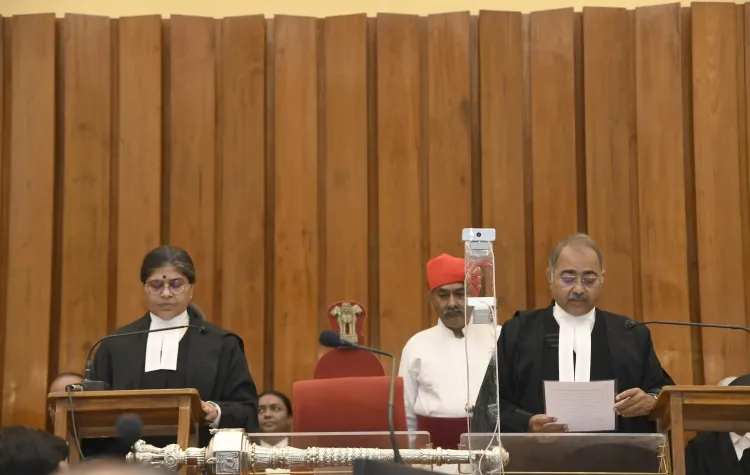Who is Justice Sanjay Gowda, the New Judge of Gujarat High Court?

Synopsis
Key Takeaways
- Justice Sanjay Gowda appointed as a judge in the Gujarat High Court.
- Previously served as a judge in the Karnataka High Court.
- Known for landmark rulings in labour law and service regulations.
- Advocated for equal pay for equal work.
- Brings extensive legal experience to the Gujarat judiciary.
Ahmedabad, June 9 (NationPress) The Chief Justice of Gujarat High Court, Sunita Agarwal, officially administered the oath of office to Justice Nernahalli Srinivasan Sanjay Gowda on Monday, marking his appointment as a judge of this esteemed court.
The swearing-in event, held at the High Court, was graced by other judges, Advocate General Kamal Trivedi, senior advocates, and various court officials.
Before his transfer to Gujarat, Justice Gowda served as a judge at the Karnataka High Court.
Born on February 15, 1967, he embarked on his legal journey after registering as an advocate with the Karnataka State Bar Council on August 31, 1989. A graduate of BMS College of Law in Bengaluru, he developed a robust legal career before being appointed as a judge in Karnataka. He took the oath as an additional Judge on November 11, 2019, and was elevated to a permanent Judge on September 8, 2021.
During his time in Karnataka, Justice Gowda rendered numerous significant judgments across various domains such as service law, labour rights, land acquisition, municipal governance, and RTI regulations. His decisions underscored fair treatment for contract workers, clarified service-related benefits, and interpreted industrial policies with legal accuracy. His tenure at the Karnataka High Court showcased his comprehensive understanding of constitutional, administrative, and labour laws.
Justice Gowda was acclaimed for his clear interpretation of service conditions and for tackling intricate issues related to recruitment, promotions, and reservation policies. In one landmark ruling, he stipulated that candidates promoted against backlog vacancies should be regarded as supernumerary until regular posts are available, thus safeguarding the integrity of reservation norms while ensuring administrative balance.
In the field of labour law, Justice Gowda advocated the principle of 'equal pay for equal work', asserting that contract workers performing identical tasks as regular employees deserved the same remuneration—a judgment that significantly impacted labour welfare and contract employment policies in Karnataka.









